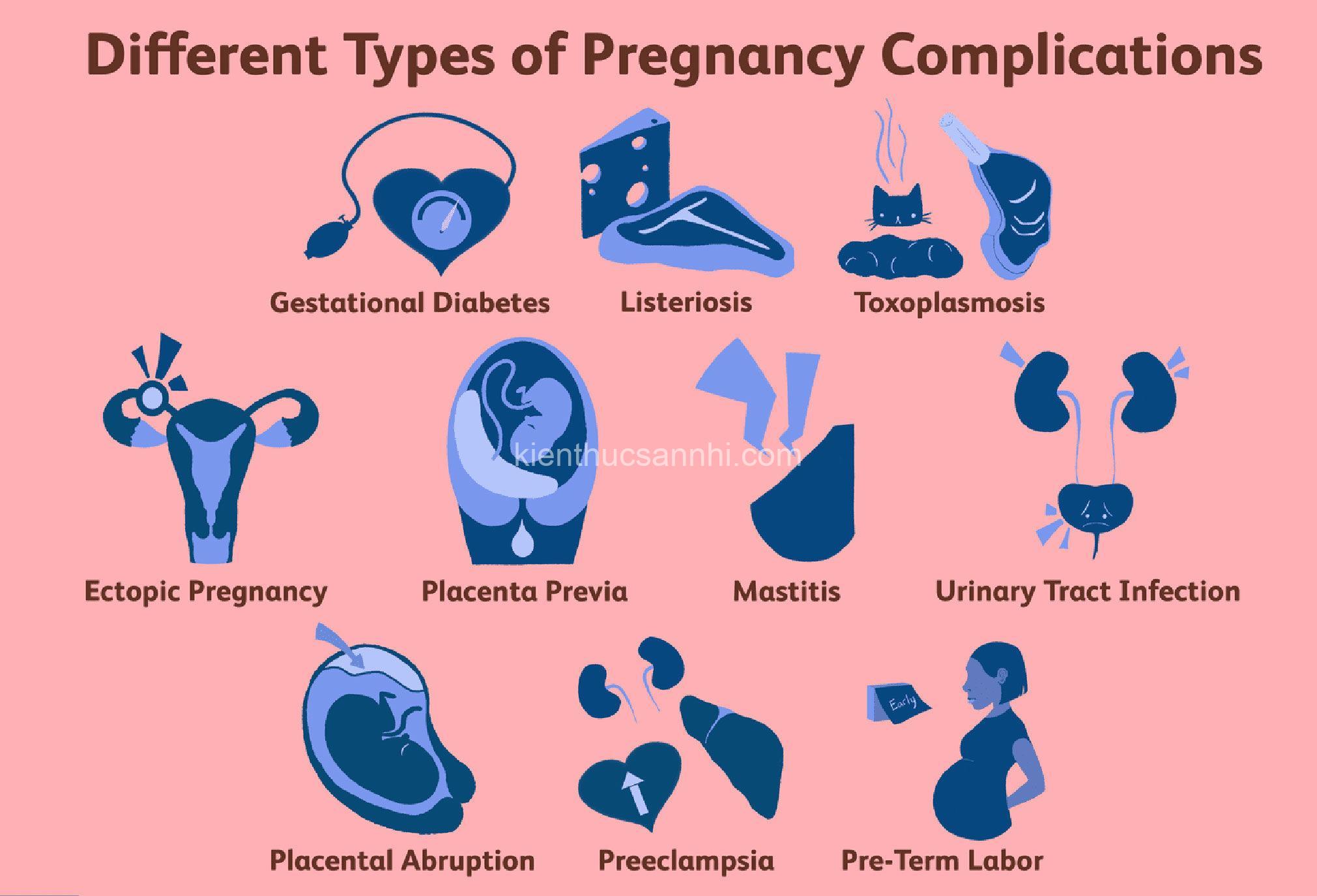
Common Prenatal Complications: Understanding Risks & Prevention. In today’s article, kienthucsannhi.com will explore with you in the most detailed and complete way. See now!
Understanding Common Prenatal Complications
Prenatal complications refer to health issues that can develop during pregnancy, affecting both the mother and the developing baby. These complications can range from mild to severe, and understanding their causes, risks, and management strategies is essential for a healthy pregnancy. It’s important to remember that every pregnancy is unique, and while some complications are more common than others, it’s vital to stay informed and seek professional guidance if you experience any concerns.

The Most Common Prenatal Complications
Here are some of the most frequently encountered prenatal complications:
Preeclampsia and Eclampsia
Preeclampsia is a serious condition characterized by high blood pressure and protein in the urine, typically developing after 20 weeks of pregnancy. Eclampsia is a more severe form of preeclampsia, involving seizures.
-
Causes and Risk Factors:
- Preeclampsia can be caused by various factors, including problems with the placenta, blood vessel abnormalities, and genetic predisposition.
- Risk factors include first-time pregnancies, multiple pregnancies, chronic hypertension, and autoimmune disorders.
-
Management and Treatment:
- Preeclampsia is typically managed with medications to lower blood pressure and prevent seizures.
- In severe cases, early delivery may be necessary to protect both the mother and the baby.
Gestational Diabetes
Gestational diabetes is a condition that develops during pregnancy, characterized by high blood sugar levels. This occurs because the body doesn’t produce enough insulin to regulate blood sugar effectively.
-
Causes and Risk Factors:
- Gestational diabetes is often caused by hormonal changes during pregnancy, which can make it more difficult for the body to use insulin efficiently.
- Risk factors include family history of diabetes, obesity, and previous pregnancies with gestational diabetes.
-
Management and Treatment:
- Gestational diabetes is typically managed with diet and exercise modifications.
- In some cases, insulin injections may be necessary to control blood sugar levels.
Premature Labor and Premature Birth
Premature labor refers to labor that starts before 37 weeks of pregnancy. A premature birth is a baby born before 37 weeks of pregnancy. Premature birth is a leading cause of infant mortality and morbidity.
-
Causes and Risk Factors:
- Premature labor can be caused by various factors, including infections, preterm rupture of membranes (PROM), cervical insufficiency, and multiple pregnancies.
- Risk factors include prior preterm births, smoking, and certain medical conditions.
-
Management and Treatment:
- Management of preterm labor involves medication to stop labor and bed rest.
- In some cases, corticosteroids are administered to help the baby’s lungs mature.
Placenta Previa
Placenta previa occurs when the placenta is positioned too low in the uterus, covering or partially covering the cervix. This can cause bleeding during pregnancy, posing risks to both the mother and the baby.
-
Causes and Risk Factors:
- The exact cause of placenta previa is unknown, but risk factors include prior placenta previa, previous uterine surgeries, and multiple pregnancies.
-
Management and Treatment:
- Treatment typically involves monitoring and bed rest.
- In most cases, a C-section delivery is recommended to minimize risks.
Placental Abruption
Placental abruption happens when the placenta detaches prematurely from the uterine wall, causing bleeding and potential complications for both the mother and the baby. This can be a serious condition.
-
Causes and Risk Factors:
- The exact cause of placental abruption is unknown, but risk factors include high blood pressure, trauma to the abdomen, smoking, and previous placental abruption.
-
Management and Treatment:
- Treatment involves monitoring vital signs, blood transfusions, and often, an emergency C-section delivery.
Fetal Growth Restriction
Fetal growth restriction occurs when the baby is not growing at the expected rate, resulting in a smaller-than-average baby for gestational age.
-
Causes and Risk Factors:
- Fetal growth restriction can be caused by various factors, including placental insufficiency, maternal health conditions, and infections.
- Risk factors include smoking, chronic hypertension, and certain medical conditions.
-
Management and Treatment:
- Management involves monitoring fetal growth, and in some cases, early delivery may be necessary.
Congenital Anomalies
Congenital anomalies are birth defects present at birth, which can range from mild to severe.
-
Causes and Risk Factors:
- Congenital anomalies can be caused by genetic factors, environmental exposures, and maternal health conditions.
- Risk factors include certain genetic disorders, exposure to alcohol or drugs, and certain infections.
-
Management and Treatment:
- Management depends on the specific anomaly and can involve surgery, therapy, and ongoing medical care.
Protecting Your Pregnancy – Prevention and Early Detection
Taking steps to prevent prenatal complications and ensure early detection is crucial for a healthy pregnancy. Here are some key strategies:
- Importance of Prenatal Care: Regular prenatal checkups and monitoring allow healthcare providers to identify potential complications early on. This includes routine blood tests, ultrasounds, and other assessments.
- Healthy Lifestyle Choices: A healthy diet, regular exercise, and avoiding smoking, alcohol, and drugs can significantly reduce the risk of certain complications.
- Early Detection Strategies: Certain tests and screenings can help detect potential complications early, such as ultrasounds, genetic testing, and blood tests. It’s essential to inform your healthcare provider about any concerns or unusual symptoms.
Managing and Treating Prenatal Complications
Managing prenatal complications involves individualized treatment plans tailored to the specific needs of the mother and baby. This often includes:
- Individualized Treatment Plans: A healthcare provider will carefully assess the situation and create a personalized plan, which may involve medication, surgery, or supportive care.
- Role of Specialists: In cases of complex or severe complications, specialists such as obstetricians, neonatologists, and other professionals will be involved in managing the pregnancy and the baby’s care.
Resources and Support
There are many resources available to help expectant mothers learn more about prenatal complications and manage their pregnancy.
- Reliable Resources: The March of Dimes, American Pregnancy Association, Mayo Clinic, and WebMD offer valuable information and support.
- Connecting with Healthcare Professionals: Open communication with your healthcare provider is essential. Don’t hesitate to ask questions, voice your concerns, and seek guidance from a trusted professional. Building a strong support network of family, friends, or a support group can also be beneficial.
Conclusion
Understanding prenatal complications is crucial for a healthy pregnancy. By following these tips and seeking regular professional care, you can protect your pregnancy and ensure a healthy outcome for both you and your baby. Please feel free to leave comments or share your experience, and be sure to visit kienthucsannhi.com for more valuable information about animals and animal care.
FAQs
What are some of the most common signs and symptoms of prenatal complications?
Common symptoms include:
- High blood pressure
- Vaginal bleeding
- Abdominal pain
- Swelling of the hands and face
- Rapid weight gain
- Changes in fetal movement
- Protein in the urine
What should I do if I experience any of these symptoms?
It’s crucial to contact your healthcare provider immediately if you experience any of these symptoms. Early detection and intervention are essential for managing prenatal complications.
Can prenatal complications be prevented?
While some prenatal complications are unavoidable, certain lifestyle choices and preventive measures can reduce the risk. This includes:
- Maintaining a healthy weight
- Eating a nutritious diet
- Avoiding smoking, alcohol, and drugs
- Getting regular prenatal care
- Managing existing health conditions.
What are the long-term effects of prenatal complications?
Prenatal complications can have various long-term effects, such as:
- For the mother: Increased risk of heart disease, stroke, and future pregnancy complications
- For the baby: Developmental delays, learning disabilities, and chronic health conditions
Are there any specific tests or screenings for prenatal complications?
Yes, there are various tests and screenings available to detect potential complications during pregnancy. This includes:
- Ultrasound: To assess fetal growth and development
- Genetic testing: To identify certain genetic conditions
- Blood tests: To monitor blood pressure, blood sugar, and protein levels





